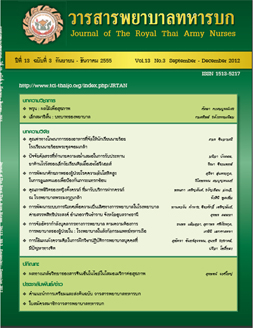ปัจจัยคัดสรรที่ทำนายความสม่ำเสมอในการรับประทานยาต้านไวรัส ของเด็กวัยเรียนติดเชื้อเอชไอวี/เอดส์ Selected Factors Predicting Antiretroviral Drug Adherence in School-Age Children With HIV-Infection/AIDS
Keywords:
ปัจจัยทำนาย, ความสม่ำเสมอในการรับประทานยาต้านไวรัส, ยาต้านไวรัส, เด็กวัยเรียน, SELECTED FACTORS, ADHERENCE, NTIRETROVIRAL DRUG, SCHOOL-AGED CHILDRENAbstract
บทคัดย่อ
การวิจัยนี้มีวัตถุประสงค์เพื่อศึกษาปัจจัยทำนายความสม่ำเสมอในการรับประทานยาต้านไวรัสของเด็กวัยเรียนที่ติดเชื้อเอชไอวี/เอดส์ กลุ่มตัวอย่างเป็นเด็กอายุ 7-12 ปี ที่ติดเชื้อเอชไอวี/เอดส์ และได้รับการรักษาด้วยยาต้านไวรัสเอดส์และผู้ดูแล จำนวน 130 คู่ คัดเลือกแบบเจาะจงจากโรงพยาบาลของรัฐ 3 แห่ง เครื่องมือวิจัยประกอบด้วย แบบประเมินความสม่ำเสมอในการรับประทานยาต้านไวรัส แบบสัมภาษณ์เด็กเกี่ยวกับความเชื่อด้านสุขภาพของเด็ก ความเชื่ออำนาจในการควบคุมสุขภาพของเด็ก แบบสัมภาษณ์ผู้ดูแลเกี่ยวกับความเชื่อด้านสุขภาพของเด็กและความคาดหวังในการใช้ยาของเด็ก ซึ่งผ่านการตรวจสอบความตรงเชิงเนื้อหา มีค่าความเที่ยงสัมประสิทธิ์แอลฟาของครอนบาคเท่ากับ .72, .73, .74, .79 และ .81 ตามลำดับ วิเคราะห์ข้อมูลโดยการหาค่าเฉลี่ย ส่วนเบี่ยงเบนมาตรฐาน ค่าสัมประสิทธิ์สหสัมพันธ์เพียร์สัน และค่าสัมประสิทธิ์สหสัมพันธ์ถดถอยพหุคูณแบบขั้นตอน
ผลการวิจัยพบว่า เด็กวัยเรียนที่ติดเชื้อเอชไอวี/เอดส์มีความสม่ำเสมอในการรับประทานยาต้านไวรัส อยู่ในระดับปานกลาง โดยปัจจัยการรับรู้ด้านสุขภาพของเด็ก ความเชื่อด้านสุขภาพของเด็กในผู้ดูแล อายุที่ทราบอาการป่วยของเด็ก และความคาดหวังในการใช้ยาของเด็กในผู้ดูแล สามารถร่วมกันพยากรณ์ความสม่ำเสมอในการรับประทานยาต้านไวรัสของเด็กวัยเรียนที่ติดเชื้อเอชไอวี/เอดส์ ได้ร้อยละ 77.3 (R2 = .773)
คำสำคัญ : ปัจจัยทำนาย; ความสม่ำเสมอในการรับประทานยาต้านไวรัส; ยาต้านไวรัส; เด็กวัยเรียน
Abstract
The purpose of this research was to examine the predictors of antiretroviral drug adherence in school-age children with HIV-infection/AIDS. Subjects were 130 children aged 7 to 12 years with HIV positive/AIDS and caregivers. They were purposively selected from 3 government hospitals. Research instruments included the antiretroviral drug adherence appraisal; the interview questionnaires of child’s health belief, health locus of control and caregiver’s belief of child health and expectation of child’s medication uses. The instruments were tested for content validity and had Cronbach’s alpha reliability of .72, .73, .74, .79 and .81, respectively. Data were analyzed by mean, standard deviation, Pearson’s product moment correlation and stepwise multiple regression analysis.
The study results revealed that school-aged children with HIV positive/AIDS had moderate adherence to the retroviral drug behavior. The child’s health belief, caregiver’s belief of child’s health, disclosure age and caregiver expectation of child’s medication uses were significant predictors of antiretroviral drug adherence in school-age children with HIV positive/AIDS. These predictors accounted for 77.3 percent of the variance (R2= .773 )
KEY WORDS: SELECTED FACTORS ; ADHERENCE ; NTIRETROVIRAL DRUG; SCHOOL-AGED CHILDREN
Downloads
Downloads
Published
How to Cite
Issue
Section
License
บทความหรือข้อคิดเห็นใดใดที่ปรากฏในวารสารพยาบาลทหารบกเป็นวรรณกรรมของผู้เขียน ซึ่งบรรณาธิการหรือสมาคมพยาบาลทหารบก ไม่จำเป็นต้องเห็นด้วย
บทความที่ได้รับการตีพิมพ์เป็นลิขสิทธิ์ของวารสารพยาบาลทหารบก
The ideas and opinions expressed in the Journal of The Royal Thai Army Nurses are those of the authors and not necessarily those
of the editor or Royal Thai Army Nurses Association.






